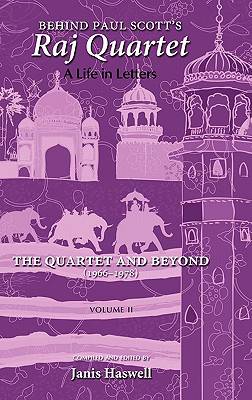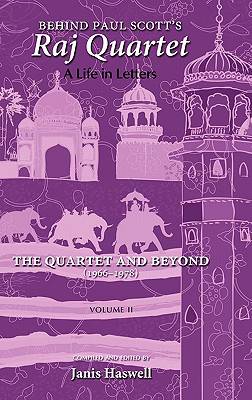
- Afhalen na 1 uur in een winkel met voorraad
- Gratis thuislevering in België vanaf € 30
- Ruim aanbod met 7 miljoen producten
- Afhalen na 1 uur in een winkel met voorraad
- Gratis thuislevering in België vanaf € 30
- Ruim aanbod met 7 miljoen producten
Zoeken
Behind Paul Scott's Raj Quartet
A Life in Letters: Volume II: The Quartet and Beyond: 1966-1978
Paul Scott, Janis Haswell
Hardcover | Engels
€ 176,45
+ 352 punten
Uitvoering
Omschrijving
If novelist Paul Mark Scott (1920-1978) has secured a niche in English literature, it is on the merits of his Raj Quartet and its sequel, Staying On, for which he won the Booker Prize in 1977. Yet by the time he had published The Jewel in the Crown in 1966, he had supported his family on his writing for six years, worked as a literary advisor for several publishers, routinely written book reviews for The Times, the Guardian, the Daily Telegraph, and Country Life, and published eight novels. Scott's literary reputation was already considerable when, at the age of 44, he embarked on The Raj Quartet that would take up the last fourteen years of his life-a masterpiece that reinterpreted the major events of his generation and challenged his contemporaries to face the legacy of their past. Beginning in 1964, Scott negotiated with the Harry Ransom Research Center at The University of Texas-Austin for the purchase of his manuscripts. Later, when he was teaching creative writing at the University of Tulsa in 1976, he arranged to sell his letters to the archives at McFarlin Library. Many years after his death, David Higham Associates (the literary agency for which Scott worked from 1950-1960 and which acted as Scott's own agent until his death in 1978) sold archival materials to the Harry Ransom Center, University of Texas-Austin. Only a limited amount of material from McFarlin's Paul Scott Collection has been published to date. The David Higham Collection has not been systematically used until now. Together, the Tulsa and Austin Collections involve many thousands of Scott's professional and personal letters, to a large degree untapped by scholars of literature. In this two-volume collection, Janis Haswell makes available to the reading public for the first time several hundred letters from the Tulsa and Austin archives, as well as dozens of private letters to daughters Carol and Sally Scott. Scott's letters never disappoint. They are intriguing, well-penned and (in most cases) well-preserved in carbon form by Scott himself. They explore in depth and detail available nowhere else his view of the themes and structure of his novels; his experience and views of India; his dealings with publishers, agents, critics, readers, and writer friends (the likes of Muriel Spark, Gabriel Fielding, M. M. Kaye); his role as an agent and influential reviewer of fiction; his trials in supporting himself and family as a freelancer; his experience as a teacher in the United States; and his love and loyalty to family and friends.
Specificaties
Betrokkenen
- Auteur(s):
- Uitgeverij:
Inhoud
- Aantal bladzijden:
- 450
- Taal:
- Engels
Eigenschappen
- Productcode (EAN):
- 9781604977509
- Verschijningsdatum:
- 28/03/2011
- Uitvoering:
- Hardcover
- Formaat:
- Genaaid
- Afmetingen:
- 152 mm x 229 mm
- Gewicht:
- 825 g

Alleen bij Standaard Boekhandel
+ 352 punten op je klantenkaart van Standaard Boekhandel
Beoordelingen
We publiceren alleen reviews die voldoen aan de voorwaarden voor reviews. Bekijk onze voorwaarden voor reviews.











